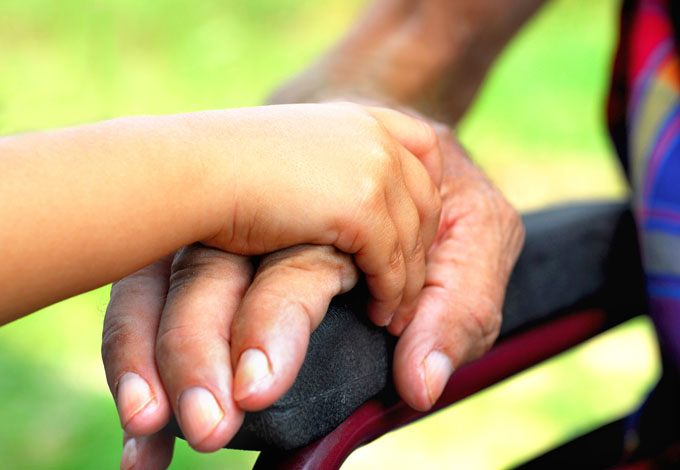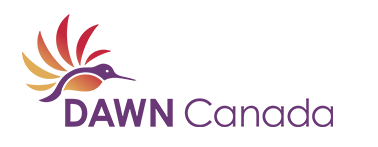
Project Overview
The DisAbled Women’s Network (DAWN) / Réseau d’action des femmes handicapées (RAFH) and the Canadian Association for Community Living (CACL) are jointly implementing a pan-Canadian project that uses a local level community development approach in addressing two priority issues of concern for people with disabilities and Deaf people – health and wellness and violence and abuse. This project is called: InFocus: Bringing People with Disabilities into the Picture. The plan is to implement the project in one demonstration community in each of the 13 provinces and territories (PT). In each demonstration community, people with disabilities and Deaf people will be brought together with the local justice, health and social services sectors to establish a coordinated community response to both the issue of health promotion and abuse against men, women and older people with disabilities and Deaf people.
Phase 1 – Research with a Purpose
Through an applied research process discussions with people with disabilities/Deaf people and key stakeholders will occur, resulting in the development of information resources and tools. These resources will then be piloted through information sessions and workshops in the 13 demonstration communities to key local sectors and people with disabilities/Deaf people.
Phase 2 – Educating and equipping the community
Distinct information sessions/workshops will be targeted to front-line service providers from specific sectors, i.e. health, programs for seniors, violence against women services, and justice, etc., and modules that share information on health-care, rights and how to stay safe will be developed for working with people with disabilities and Deaf people.
In the area of anti–violence work, there will be a second phase of workshops and working groups for the sectors and for people with disabilities/Deaf people. The second phase information sessions for the sectors will involve how to organize and implement a safety audit – that is, a way to examine their agencies internally to see where people with disabilities and Deaf people may not be properly served. It offers ways to share these learnings with organizations represented on the local steering committee, in pursuit of a coordinated community response to violence.
The second phase of workshops for individuals will involve working on a long term person-centred safety planning process. In the area of safety for the elderly, workshops will assist individuals and families in planning for a safe future as individuals’ age. Once an individual plan is identified, all relevant supports in a local community are then mobilized to work collectively with the individual and family in implementing these long term plans.
ABOUT THE CANADIAN ASSOCIATION FOR COMMUNITY LIVING
The Canadian Association for Community Living is a family-based association assisting people with intellectual disabilities and their families to lead the way in advancing inclusion in their own lives and in their communities. We do this in Canada and around the world by sharing information, fostering leadership for inclusion, engaging community leaders and policy makers, seeding innovation and supporting research. We are dedicated to attaining full participation in community life, ending exclusion and discrimination on the basis of intellectual disability, promoting respect for diversity and advancing human rights to ensure equality for all Canadians
The community living movement began in the early 1950’s by groups of families who wanted alternatives to institutions for their children. Children with intellectual disabilities couldn’t gain access to public education, so they started schools. Adults had few options for employment, nowhere to go and little to do, so they built sheltered workshops and day programs. Affordable housing and support for independent living were not available, so group homes were built. These services were the solutions to problems of their day. Now, it is time for Canadians to recognize that people with intellectual disabilities must live everyday lives with the same freedoms, choices and opportunities as other Canadians. Kids going to school with their neighbourhood friends, young adults entering the labour market and working real jobs for real pay, people choosing a home and making a life in their communities. When all people and their families are fully included in everyday life, living in communities that are truly diverse: this is the picture of inclusion.
CACL has over 50 years of experience in delivery and managing similar national projects and implementing the work in every PT in Canada to advance the full inclusion of people with disabilities in society. With our provincial/territorial counterparts, CACL is building partnerships for change, supporting research and sharing knowledge, developing policy options, and strengthening the leadership capacities of families to help guide the change process. CACL as a national federation of over 40,000 individual members 400 local associations and 13 Provincial/Territorial Associations for Community Living has an established infrastructure that provides the capacity to root projects of this scale in local communities throughout the country, while also connecting with relevant PT networks. These projects have focused on disability priority issues including access to health and social services, employment and addressing violence.
ABOUT DISABLED WOMEN’S NETWORK (DAWN)-RÉSEAU D’ACTION DE FEMMES HANDICAPÉES (RAFH) CANADA
DAWN-RAFH Canada is a national feminist disability organization controlled by and comprised of women who self-identify as Women with Disabilities. Established in 1986, DAWN-RAFH Canada is the only national disability organization that advocates and works towards the advancement and inclusion of women and girls with disabilities and Deaf women in Canada. Our overarching strategic theme is one of leadership, partnership and networking to engage all levels of government and the wider disability and women’s sectors and other stakeholders in addressing our key issues. DAWN-RAFH Canada’s unique (feminist/disability) perspective has proven invaluable to this work.
Being a bilingual organization with our head office located in Montreal and a strong presence in Québec also has proven to be important in bringing attention to the voices, research and needs identified by our Francophone constituents, who are often not adequately heard at the national level and who are particularly vulnerable when outside of Québec DAWN-RAFH Canada is building a collection through the Centre de documentation sur l’education des adultes et la condition feminine (CDEACF), the first and only one of its kind in Canada and the world.
Our vision and practice of inclusion means that we endeavour to represent the concerns of women with disabilities across their socio-demographic diversity (i.e. race, language, immigrant status, First Nations, sexual orientation, age, etc.), their different types of disabilities and regional differences.
DAWN-RAFH Canada’s Board is comprised entirely of women with disabilities from all regions of Canada. Our staff is led by a woman with a disability and includes both women with and without disabilities. The Board represents a diverse cross-section of women with disabilities and includes younger and older women, single mothers, women of different linguistic, racial and cultural backgrounds, as well as First Nations. This diversity in our leadership ensures that as women with disabilities we are at the forefront of designing initiatives affecting our lives.
DAWN-RAFH Canada is in the process of establishing six regional partners; 1) the Atlantic provinces (Nova Scotia, New Brunswick, Prince Edward Island, Newfoundland & Labrador), 2) Quebec, 3) Ontario, 4) Prairie provinces (Manitoba, Saskatchewan, Alberta), 5) British Columbia and 6) the Territories (Northwest Territories, Yukon and Nunavut).
THE DAWN-RAFH CANADA AND CACL NATIONAL PROJECT TEAM
The national project team will be responsible for the overall direction of the InFocus initiative through providing project administration, national coordination, support, financial management, and ongoing leadership. The national project team consists of:
- Bonnie Brayton, National Executive Director, DAWN-RAFH Canada
- Michael Bach, Executive Vice-President, CACL
- National Director – Doris Rajan, Director of Social Development, Institute for Research and Development on Inclusion and Society (IRIS)
- Jillian Arkles, Coordinator, Community Development, CACL
- Fatima Gardaad, Coordinator, Community Development, DAWN-RAFH Canada
OUR NATIONAL PARTNERS
PROVINCIAL AND TERRITORIAL ASSOCIATIONS FOR COMMUNITY LIVING
PT ACLs are responsible for working with the national project team and the DAWN-RAFH Regional Coordinators to support work in local communities. Once local infrastructure has been established in each province and territory, the main function of the PT ACLs will be to provide support to local players as necessary and conduct financial administration. PT ACLs may wish to sit on the local steering committee.
DAWN-RAFH CANADA REGIONAL COORDINATORS
DAWN-RAFH Canada Regional Coordinators will work closely with the local community in their region with the purpose of ensuring that the needs of women with disabilities and Deaf women are clearly articulated and included in project work. DAWN-RAFH Canada Regional Coordinators represent the following regions:
- British Columbia
- Prairies (Alberta, Saskatchewan, Manitoba)
- North (Northwest Territories, Nunavut, Yukon)
- Ontario
- Quebec
- Atlantic (New Brunswick, Newfoundland, Prince Edward Island, and Nova Scotia)
SENIORS AND YOUTH OUTREACH WORKERS
CACL and DAWN-RAFH Canada have engaged two outreach workers to assist with conducing outreach to seniors and youth for the InFocus initiative. They will be working to ensure that youth and seniors are represented and included throughout the project. Both outreach workers also bring the perspectives of those labeled with an intellectual disability to the project through their lived experiences and their involvement with the People First movement in Canada.
PEOPLE FIRST OF CANADA
People First of Canada (PFC) is a national organization with provincial and local chapters that was formed to support the full inclusion of people labeled with having an intellectual disability. PFC will work closely with local communities in regions where PFC has local member organizations through participating in the local steering committee. PFC’s representation will be for the purpose of ensuring that the needs of persons labeled with intellectual disabilities are articulated clearly and included in project work.
WOMEN WITH DISABILITIES: EXPERTISE FROM OUR COMMUNITY
DAWN-RAFH Canada and CACL recognize the importance of bringing women with disabilities professionals to this work. The lived experience of being women with disabilities and Deaf women, combined with the expertise that comes from applied community development experience will inform every phase of the projects.
This project has been funded by Status of Women Canada.
